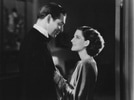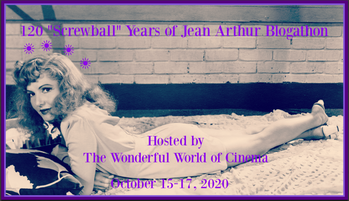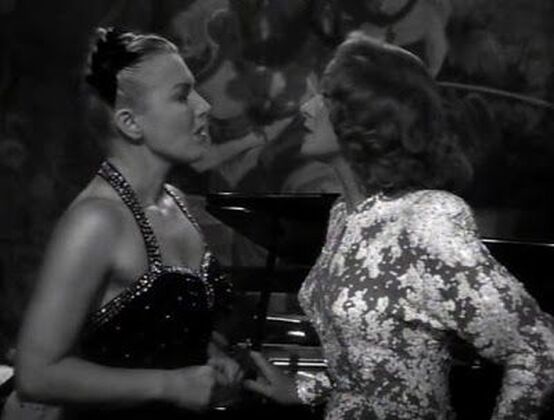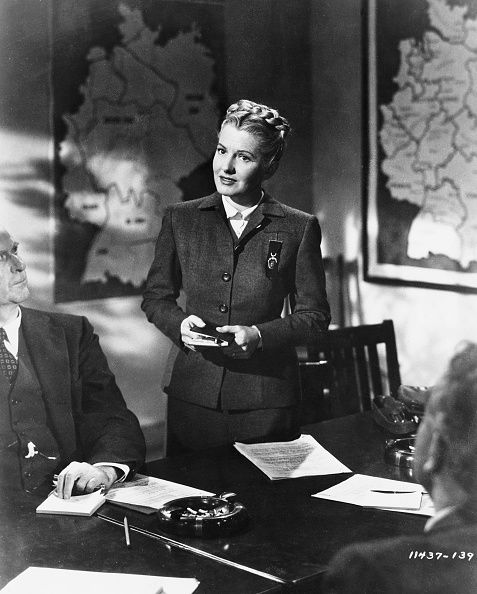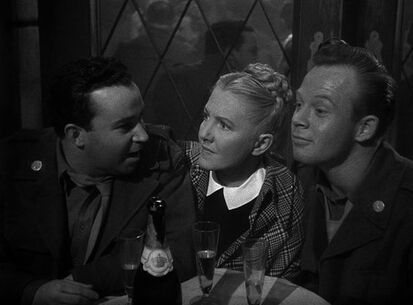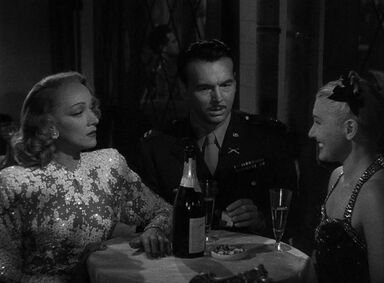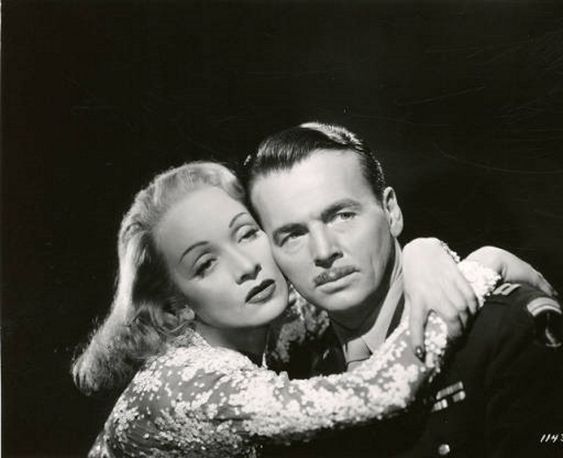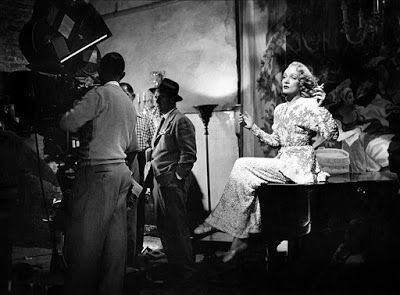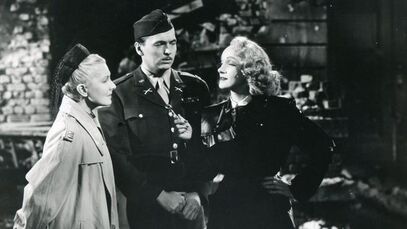Jean Arthur in A Foreign Affair
|
Directed By: Billy Wilder
Starring: Jean Arthur, Marlene Dietrich & John Lund Released: 1948 Release Studio: Paramount IMDB Rating: 7 Columbia Pictures head Harry Cohn once described Jean Arthur’s face as “half angel, half horse” & she herself demurred “we create an illusion on the screen…but I can’t be glamorous like, say, Marlene Dietrich.” (Basinger, p. 312). Despite these apparent deficiencies & debilitating stage fright, Arthur was able to carve out a relatively long and fruitful career that included no fewer than a dozen memorable performances. Included among the very best of her films was one of her last, A Foreign Affair, directed by Billy Wilder and co-starring the aforementioned Dietrich, as well as John Lund. Released in 1948, when she was 47 years old, Arthur would go on to make only 1 more feature film, 1953’s Shane, before retiring from movies for good.
|
While her movie personae was largely created in 3 Frank Capra classics (Mr. Deeds Goes to Town ‘36, You Can’t Take it with You ‘38 & Mr. Smith Goes to Washington ’39), by the time A Foreign Affair came around, Arthur had made just one movie in the previous 5 years & nobody realized it was to be the last time she appeared in a “Jean Arthur” role. As perky & persnickety Iowa congresswoman Phoebe Frost, Arthur captures the magic that made her a star by combining her seemingly innate cheerfulness, with a schoolmarm’s finger wagging. She is attached to a congressional delegation exploring conditions in post-WWII Berlin when she realizes there’s more hanky panky going on than real nation building. Her constant notetaking, fussbudget clothing & tightly wound hair style immediately paint her as an uptight virgin, out to ruin everyone’s good time, particularly black marketeer Captain John Pringle (Lund). He’s involved with nightclub singer & former Nazi Erica Von Schlutow (Dietrich), who just happens to have arrived on Frost’s radar as an example of Army complicity in all the shenanigans taking place in Berlin.
Director Wilder sets up the perfect love triangle, with Lund playing on Frost’s romantic naivete in order to cover his tracks with Von Schlutow & maintain his dubious lifestyle. In pitting Frost against Von Schlutow & therefore Arthur against Dietrich, Wilder plays with Dietrich’s glamour that Arthur herself recognized, as well as Arthur’s personae both in their character’s attitudes and their physical appearance. Arthur is made to look like a German hausfrau, fresh off the farm, while Dietrich is allowed to wear elegant gowns, studio makeup & perfectly coifed hair, all while living in a bombed-out tenement. Where Von Slautow is melancholy & seemingly carefree, Frost is cold, bewildered & pinched, as unsexy as possible for someone as lovely as Arthur.
Director Wilder sets up the perfect love triangle, with Lund playing on Frost’s romantic naivete in order to cover his tracks with Von Schlutow & maintain his dubious lifestyle. In pitting Frost against Von Schlutow & therefore Arthur against Dietrich, Wilder plays with Dietrich’s glamour that Arthur herself recognized, as well as Arthur’s personae both in their character’s attitudes and their physical appearance. Arthur is made to look like a German hausfrau, fresh off the farm, while Dietrich is allowed to wear elegant gowns, studio makeup & perfectly coifed hair, all while living in a bombed-out tenement. Where Von Slautow is melancholy & seemingly carefree, Frost is cold, bewildered & pinched, as unsexy as possible for someone as lovely as Arthur.
Arthur is at her comic best, however, as she beguiles 2 hapless soldiers, pretending to be a helpless German maiden, wide eyed & answering ‘ja’ to every question, no matter how demeaning or inappropriate. She uses the 2 dupes to gain access to the Lorelei, the club where Dietrich sings & is the epicenter of everything wrong with the American zone in Berlin. Lund spies the congresswoman’s charade & embarks on a charade of his own to convince her he loves her while the 2 investigate the singer. Laying charm on as think as Iowa corn syrup, Lund begins to thaw Frost & the couple’s file room courtship is a mix of verbal hilarity, romantic wit & perfect choreography. Arthur plays her frigidness to the hilt, as a mixture of fear, ignorance & naivete, but cracks begin to appear. Never has a filibuster been less effective.
Dietrich, on the other hand, revels in her sexiness, criticizing Frost’s lack of sexual appeal to her face, smirking as she covers for her beloved Johnny. She practically slithers around The Lorelei in each of the 3 set piece songs Wilder provides her. She is a woman clearly willing to trade on her sexuality, exploiting anyone & everyone to survive, a point she makes clear intimating what happened when the Russians arrived in Berlin before the Americans. Frost clearly can’t compete, but Pringle’s wooing takes on epic proportions as he talks about protons, electrons & feed & gran men, sweeping the ever-increasing flightiness of Frost off her feet in the moonlight, separated only by a suitcase. Arthur’s eyes dart & her voice softens as she gazes first into the sky, then into Pringles eyes. “Good night. Good morning. Good evening” indeed! She practically glides up the stairs & Arthur is full on gobsmacked as she wanders into a fellow congressman’s hotel room!
Dietrich, on the other hand, revels in her sexiness, criticizing Frost’s lack of sexual appeal to her face, smirking as she covers for her beloved Johnny. She practically slithers around The Lorelei in each of the 3 set piece songs Wilder provides her. She is a woman clearly willing to trade on her sexuality, exploiting anyone & everyone to survive, a point she makes clear intimating what happened when the Russians arrived in Berlin before the Americans. Frost clearly can’t compete, but Pringle’s wooing takes on epic proportions as he talks about protons, electrons & feed & gran men, sweeping the ever-increasing flightiness of Frost off her feet in the moonlight, separated only by a suitcase. Arthur’s eyes dart & her voice softens as she gazes first into the sky, then into Pringles eyes. “Good night. Good morning. Good evening” indeed! She practically glides up the stairs & Arthur is full on gobsmacked as she wanders into a fellow congressman’s hotel room!
While Arthur’s performance is deeply comic, she leaves her most effective acting for when she lets her hair down, so to speak. She becomes incredibly insecure, a woman for the first time, as she descends the stairs in a black-market dress. She is smitten & vulnerable & Arthur lets it take over her performance. Her feelings are sincere, a stark contrast to Pringle & even Von Schlutow’s cynical & manipulative view of love & Frost’s drunken escapade at the Lorelei not only makes Pringle uncomfortable, but raises the ire of Von Schlutow.
What transpires in the 3rd act brings the love triangle to a head & a forces all three characters to mask their true feelings for their respective countries, giving the final crescendo to Arthur’s performance as it moves from giddiness to heartbreak. The single tear, captured in silhouette, says everything about her character & the tenderness of her performance. Arthur’s performance is complete and amplifies her incredible ability to bring pathos to comedy.
A Foreign Affair has often been cited as one of the iconic performances in Marlene Dietrich’s career, but clearly Jean Arthur not only held her own, but gave the film its emotional center. Wilder, who was often called overly cynical, needed a performance like Arthur’s to deflect the unlikability & insincerity of Pringle & Von Schlutow. That she was able to build a three-dimensional character in a farce is merely a tribute to her skill and on screen likability.
Sources:
The Star Machine. Jeanine Basinger. Alfred A. Knopf. 2007.
Wilder Times: The Life of Billy Wilder. Kevin Lally. Henry Hot & Company. 1996
Marlene Dietrich: Life & Legend. Steven Bach. William Morrow & Company. 1992.
What transpires in the 3rd act brings the love triangle to a head & a forces all three characters to mask their true feelings for their respective countries, giving the final crescendo to Arthur’s performance as it moves from giddiness to heartbreak. The single tear, captured in silhouette, says everything about her character & the tenderness of her performance. Arthur’s performance is complete and amplifies her incredible ability to bring pathos to comedy.
A Foreign Affair has often been cited as one of the iconic performances in Marlene Dietrich’s career, but clearly Jean Arthur not only held her own, but gave the film its emotional center. Wilder, who was often called overly cynical, needed a performance like Arthur’s to deflect the unlikability & insincerity of Pringle & Von Schlutow. That she was able to build a three-dimensional character in a farce is merely a tribute to her skill and on screen likability.
Sources:
The Star Machine. Jeanine Basinger. Alfred A. Knopf. 2007.
Wilder Times: The Life of Billy Wilder. Kevin Lally. Henry Hot & Company. 1996
Marlene Dietrich: Life & Legend. Steven Bach. William Morrow & Company. 1992.
